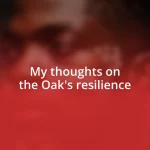Key takeaways:
- Mental health therapy involves a journey of self-discovery, utilizing various techniques like CBT and mindfulness, leading to emotional insights and personal growth.
- Choosing the right therapist is crucial; a strong personal connection often outweighs credentials, enhancing comfort and openness for effective therapy.
- Overcoming barriers such as stigma, logistics, and self-doubt is essential for individuals seeking therapy, emphasizing that everyone’s experiences are valid and worthy of support.
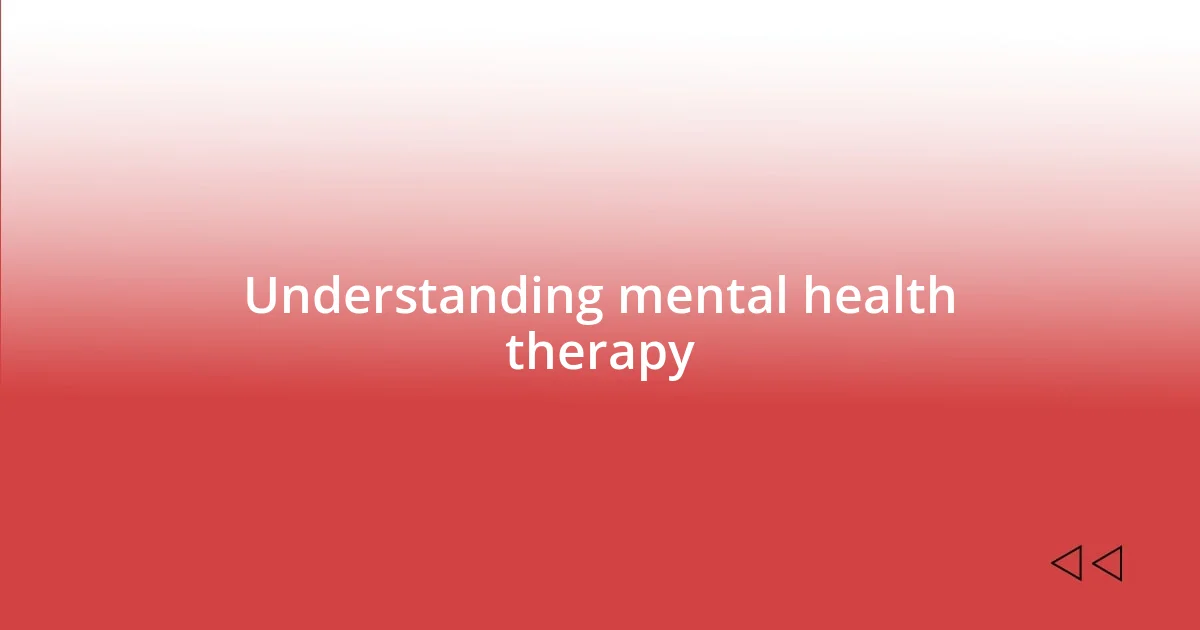
Understanding mental health therapy
Mental health therapy is a transformative process that helps individuals navigate their emotional landscapes. I remember walking into my first therapy session feeling a mix of hope and apprehension, unsure of what to expect. Have you ever been in a situation where opening up felt daunting yet necessary? That’s the essence of starting therapy—taking that brave step to explore your feelings in a safe space.
In therapy, you’ll often encounter various techniques and approaches, from cognitive-behavioral therapy (CBT) to mindfulness practices. Each method has its strengths, and it’s fascinating to observe how different strategies resonate with different people. Personally, I found mindfulness to be a game-changer; it allowed me to stay grounded in the present, instead of getting lost in my worries. When was the last time you took a moment to breathe and simply be?
The journey of therapy is not linear; it involves moments of breakthrough and moments of struggle. There were days I left feeling lighter and days when the weight felt heavier. It’s essential to remember that this ebb and flow is part of the process. Have you ever noticed how sharing your thoughts can lead to unexpected clarity? For me, those moments of insight often emerged when I least expected them, proving that therapy can be as much about self-discovery as it is about healing.

Benefits of mental health therapy
Engaging in mental health therapy can lead to numerous benefits that often transcend what one might initially expect. From my own experience, one significant advantage is the improved relationship you can have with yourself. I vividly recall a time when I learned to confront my inner critic instead of letting it dictate my self-worth. This newfound self-compassion helped me feel more at ease with my imperfections and has contributed to a more resilient mindset.
Here are some benefits of mental health therapy I’ve observed:
- Enhanced self-awareness: Therapy can uncover underlying thoughts and patterns that influence behavior.
- Improved coping skills: I’ve developed various strategies to manage stress and anxiety more effectively.
- Better emotional regulation: Learning to identify and express feelings has made a significant difference in how I handle challenges.
- Strengthened relationships: Addressing personal issues in therapy has helped me communicate more openly with loved ones.
- Increased resilience: Navigating through tough discussions has made me feel more equipped to face life’s ups and downs.
Each of these elements contributes to a holistic improvement in mental and emotional well-being, allowing individuals to engage more fully in life.
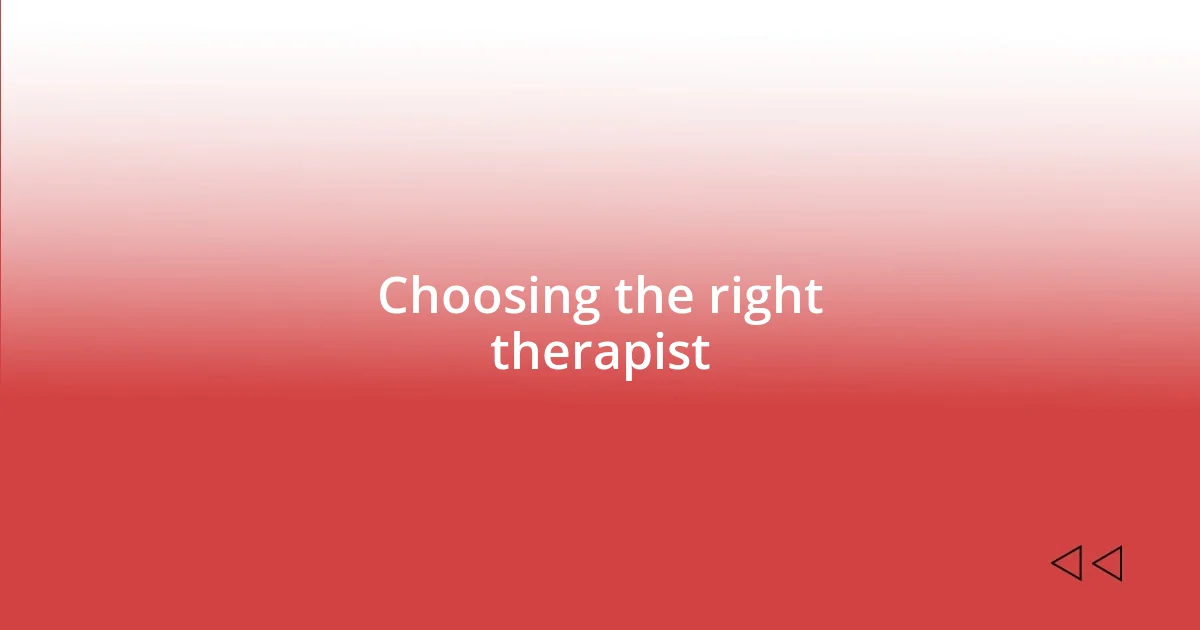
Choosing the right therapist
Choosing the right therapist is a crucial step in your mental health journey. I remember the feeling of uncertainty I had when I was looking for someone to guide me. It’s vital to find a therapist who not only understands your struggles but also resonates with you personally. Have you ever thought about how different personalities can affect the therapeutic relationship? For me, having someone who felt approachable made a world of difference.
When considering options, think about what you need most—be it a specific approach or even a gender preference. I once made the mistake of prioritizing credentials over personal rapport, and it didn’t click for me. A strong connection with your therapist can enhance your comfort and openness, which are essential for progress. What do you think is more important: qualifications or a comforting presence? In my experience, it’s a delicate balance, but feeling safe to express myself led to greater breakthroughs.
I’ve found that it’s helpful to schedule a trial session or consultation to gauge compatibility. Sometimes, intuition plays a significant role in this decision. I recall one instance where I met a therapist who initially seemed promising, but as our conversation unfolded, I sensed a mismatch in our communication styles. Trusting my instincts allowed me to seek someone who truly aligned with my journey. Remember, therapy is a personal experience; don’t hesitate to be selective in finding the right fit.
| Criteria | My Experience |
|---|---|
| Therapist’s Approach | A supportive approach made me feel safe and heard. |
| Personal Connection | A good rapport encouraged me to open up more easily. |
| Credentials | While important, they weren’t my top priority—connection was. |
| Intuition | Your gut feeling can guide you toward the right choice. |
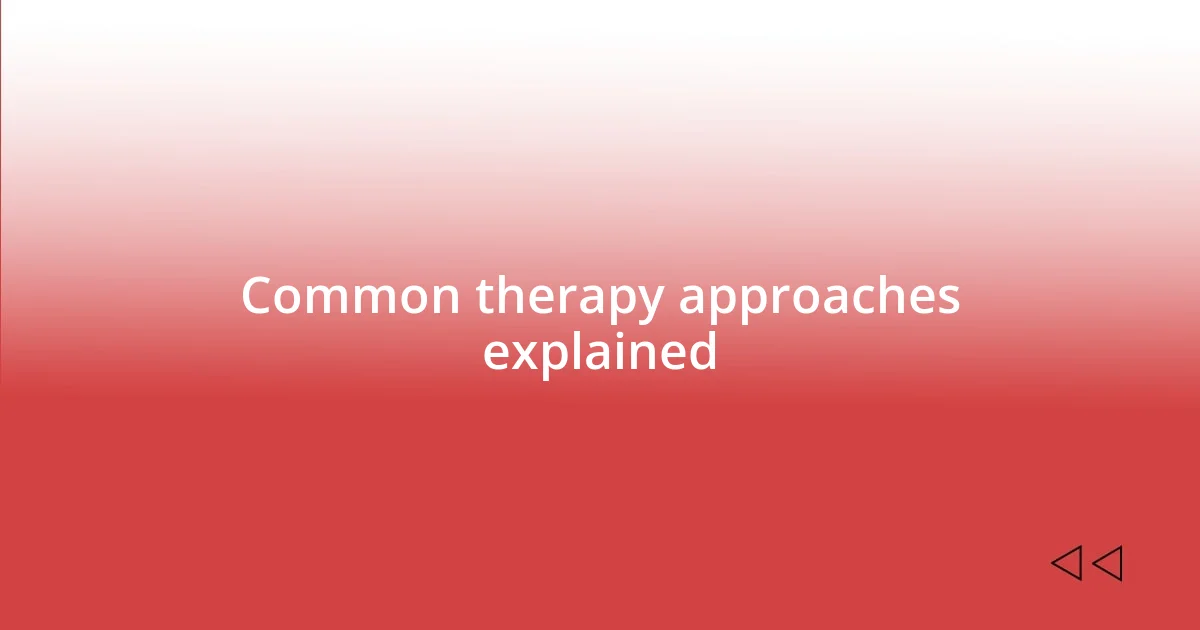
Common therapy approaches explained
Cognitive Behavioral Therapy (CBT) is one of the most well-known approaches, focusing on changing negative thought patterns. I remember my first session, where my therapist helped me identify how my thoughts influenced my feelings and behaviors. This method not only provided me with practical tools but also empowered me to reshape my mindset, leading to more positive outcomes in my daily life.
Another approach that caught my attention is Dialectical Behavior Therapy (DBT), particularly beneficial for those struggling with emotional regulation. The blend of mindfulness techniques with practical skills felt almost like a revelation to me. Reflecting on my experiences, I found that practicing these skills helped me manage overwhelming emotions, allowing me to navigate through stress without feeling lost or reactive.
Finally, let’s consider Person-Centered Therapy, which emphasizes empathy and genuine connection. I vividly recall the profound sense of relief I felt when my therapist listened without judgment, allowing me to explore my feelings freely. This approach reminded me of the importance of trusting the therapeutic process, nurturing my growth in a supportive environment. Have you ever felt that deep sense of being heard? It’s a powerful catalyst for change.
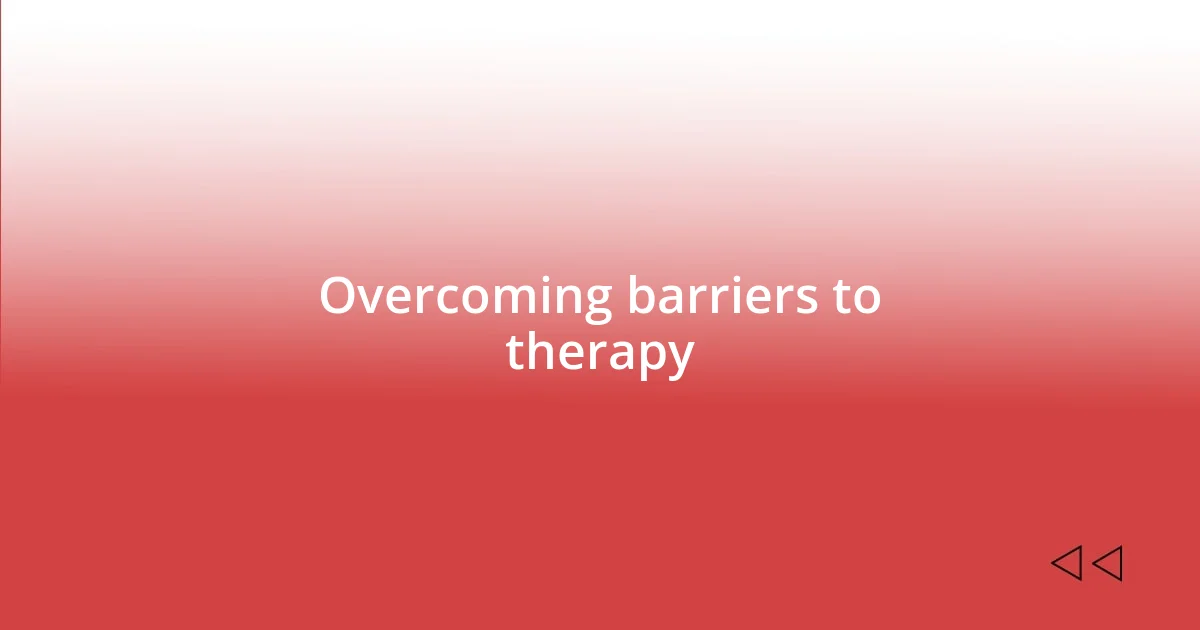
Overcoming barriers to therapy
One major barrier to therapy is the stigma that surrounds mental health. I remember when I hesitated to seek help, worried about what others would think. It felt like a weight pressing down on me, yet when I finally spoke to a close friend about my fears, I discovered they’d faced similar struggles. Talking it out helped me realize that opening up is often the first step in overcoming that stigma.
Another significant hurdle can be logistics—finding time, affording sessions, or even just knowing where to start. There was a time when my busy schedule made it seem impossible to squeeze in a therapy appointment. But I learned that prioritizing my mental health was just as essential as my other commitments. Have you ever carved out time for something that truly matters to you? Sometimes, flexible scheduling options, like virtual sessions, can ease that burden and make a world of difference.
Lastly, I’ve found that self-doubt often creeps in, convincing many people that their issues aren’t valid enough for therapy. I once doubted whether my struggles were “serious” enough to warrant professional help until a session reminded me that everyone’s pain is unique and worthy of attention. Have you considered how many people share these doubts? Recognizing that seeking support is a sign of strength can create a powerful shift in perspective, encouraging more individuals to take the plunge into therapy.
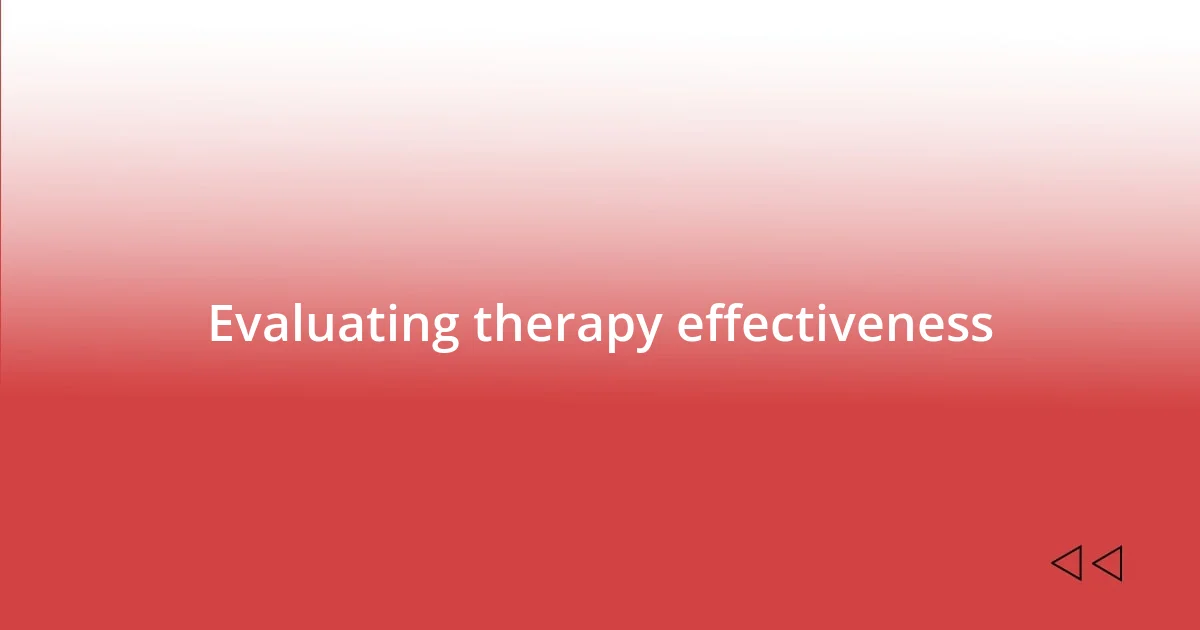
Evaluating therapy effectiveness
Evaluating the effectiveness of therapy can be a deeply personal journey. I’ve often found myself reflecting on my progress after sessions. Did I feel lighter? Did I gain clarity on my feelings? Those moments of self-reflection played a crucial role in my understanding of what worked for me, helping me to identify patterns and shifts over time.
Moreover, I think it’s essential to consider tangible changes alongside emotional growth when assessing therapy’s impact. For instance, after a few months of consistent sessions, I noticed that I was handling conflicts with friends in a much healthier way. This wasn’t just a theoretical learning; it was a real-life application that reinforced the effectiveness of my therapy. Have you ever thought about how these small victories can be my way of measuring success?
Finally, feedback from the therapist also serves as a valuable tool in evaluating effectiveness. In one of my sessions, my therapist pointed out improvements I hadn’t recognized. Hearing that perspective felt validating and renewed my motivation to continue. Do you believe that an outside perspective can shed light on our growth that we often overlook? Engaging in these discussions can not only bring awareness to our progress but also strengthen the therapeutic relationship itself.






